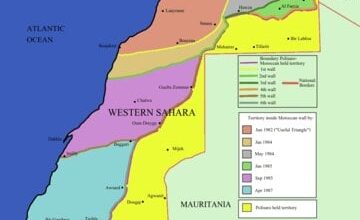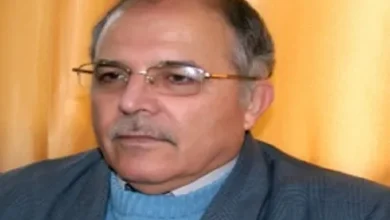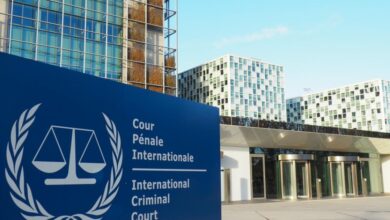
Ibrahim Ebeid: My Roots are Deep in Palestine
CHAPTER 3 Part I
NAOUM AND FAMILY LIVING IN JAFFA UNTIL 1948
My father grew up as a peasant. He worked many years tilling the land until he married my mother, Miriam Shehadeh Hanna Musallam in 1931. Life became harder and impossible for him to stay in Birzeit in the same house with the rest of the family. He always
felt unfavorable treatment by his stepmother, so he was encouraged to move by Aunt Adlah to Jaffa, where she was working
He got a job at a printing shop for an orange-exporting firm, Al-Malak Export Company. Later on, Aunt Adlah, through her employer, got him another job in a law firm, Houmssy and Salameh. He was the caretaker of the offices until May 1948. It was a good job for him, nice and easy. Habib Houmssy, the head lawyer, was a very decent man and generous. He did not fail to help my father financially, especially on holy days. After Jaffa was occupied and we became refugees, he continued helping us. I used to drop by the offices to play and chat with the lawyers and employees. As a child, I enjoyed the candy and chocolate they gave me and my favorite pastime was playing with the typewriter and the carbon papers that smeared my hands and clothes.
Living in Jaffa
Jaffa was one of the largest cities in Palestine. Its population, including suburbs, was about 125,000 in the mid-1940s of the 20th century. It was built by our ancestors, the Phoenicians, in about 4000 BCE, long before the appearance of the Bible. Jaffa means “the beauty” in the language of our Phoenician ancestors. Indeed, it was beautiful and no wonder it was known as the Bride of the Sea. It was famous for its orange groves that surrounded many sections of the city.
Before 1948, it was the center of industry in Palestine. By the 1930s, Jaffa was exporting tens of millions of citrus crates to the rest of the world, providing thousands of jobs for the people of the city and its environs and linking them to the major commercial centers of the Mediterranean coast and the European continent. Import and export companies, banks, publication houses, textiles and various industries flourished and thousands of jobs were created. Jaffa was also the cultural capital of Palestine. Publishing houses, theaters, and cultural clubs thrived and the major daily newspapers were published in Jaffa.
My parents were working very hard to bring up four children; all were boys: George, Ibrahim, Michel, and Elias.
Hanneh, the daughter of Ebeid, was very eager to see the house of Ebeid getting larger and expanding. She was
.also very happy to see Naoum, her grandnephew, having children, all boys.

Our family: Miriam my mother
Naoum my father, Ibrahim
Michel, George and Elias circa 1945
- George was born in 1932
- Ibrahim was born in 1935
- Michel was born in 1939
- Elias was born in 1942
Few weeks before she died, Hanneh met Aunt Louisa in church. She knew that my mother was expecting and asked if Miriam gave birth. My Aunt Louisa lied to her and told her, yes, it was a boy. Great-grandaunt Hanneh said in Arabic, “Alhamdulillah illi imrit dar abi” (thank God that my father’s house expanded). She was very happy to see the family getting larger; she died at peace two weeks before Elias was born.
My mother made it a tradition to give birth in Birzeit. My brother George and I were born in the house of Ebeid where step Grandmother Katrina and my aunt Jalileh were taking care of her and of the newborns. She stayed there about a month then returned to Jaffa. Michel was also born in the house that my father and Amti (aunt) Adlah built in Birzeit. Amti Louisa was the one who helped, and she was living in Birzeit at the time, employed by the Catholic priest, Father Leonard Girard. Elias was the only one to be born in Jaffa. I remember the day he was born; it was on May 11, 1942 early morning. I went to the house of the midwife to tell her that my mother was ready to give birth. Her house was a block away.I was seven years old. It was an exciting moment to have a new baby brother in the family. That day I missed school.
George was named after my grandfather Jiryes (George is another version of Jiryes). Grandfather named me Ibrahim after his father and the two sons who did not live long. A few days after my birth, Grandmother pulled the belly button cord by mistake. I bled a little and this caused an infection that made me gravely ill with high fever and I started losing weight. The doctor in Ramallah told my mother “Take your child home. He is dying.” My mother was very desperate. She returned to Grandfather’s house where the family gathered to be by my deathbed. My grandfather was crying and he repented for naming me Ibrahim, for having no luck with this name, His father was named Ibrahim and died at the age of 30. His first son Ibrahim was a few months old when he died. The second son, also Ibrahim, died when he was 16. He wanted to change my name but my mother refused. The family rushed me back to Jaffa where Dr. Khalil Saba treated me. I survived and the family members were happy. Michel was named after Khalil the son of Ebeid. He was baptized with that name, and later on he was known as Michel.
We lived in different houses; three houses were in al-Ajami and one in al-Nuzha, the newest neighborhood in Jaffa, adjacent to al-Ajami. That section was beautifully decorated with fountains, gardens with palm trees and exotic flowers. It was a pleasure to walk in that area. Even though Jaffa was very beautiful, al-Nuzha was different and special.
 Jaffa on the sea: close to our house
Jaffa on the sea: close to our house
 Jamal Pasha St. in Nuzha section in Jaffa
Jamal Pasha St. in Nuzha section in Jaffa
The last house we lived in was a small house located in an orange orchard that belonged to the Jallad family. We were not paying rent, and it was located in the al-Ajami neighborhood of Jaffa. About half a block away, was al-Hilweh Street that crossed Jaffa from south to north. It was a busy street; traffic and shops were abundant.
Orange orchards were in the city and the houses were at the edge of the orchards and close to the street. Our house was no exception. The orchard was beautiful; the fragrance of the orange blossoms was exquisite. There were four pools for irrigation. They were larger than swimming pools and deeper. We swam there in the hot simmering summer days or sometimes in the water concrete canals that ran all over the orchard.
The beach was about three or four blocks away and we enjoyed it tremendously. Sometimes we snuck out there, without the knowledge of our parents, unaccompanied by adults. When they found out, we were punished and grounded.
In Jaffa, I learned to love the land and agriculture. I cultivated a little garden full of various flowers, from jasmine to gardenia. The love of flowers stayed with me until now, in Chicago, where I made my balcony and our living room a little garden that attracted many people to admire and praise the wonderful display.





